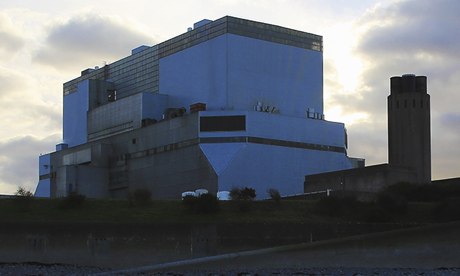The government has been urged to be more honest about the levels of subsidies given to oil and gas producers and the companies who will build a new nuclear power station at Hinkley Point.
A parliamentary watchdog argued on Monday that ministers should admit they are already providing £12bn of annual subsidies to fossil fuel operations and windfarms while lining up more support for shale gas and nuclear.
The environmental audit committee (EAC) said subsidies to oil and other carbon fuels should be scaled back because of the impact on global warming, and also urged ministers to restate a previous commitment to ending fuel poverty.
A report on energy subsidies just published by the committee says the chancellor's autumn statement later this week is an ideal chance to provide a "clear and comprehensive analysis of energy subsidies in the UK".
The report says such a move would bring much needed transparency and provide a basis for an overdue debate on the rationale and justifications for providing public money to support the energy sector.
"At the Rio+20 [climate change] summit and the G20, the government committed itself to phasing out fossil fuel subsidies that encourage wasteful consumption and contribute to greenhouse gas emissions," said MP Joan Walley, chair of the EAC. "The government must set a target to reduce subsidies to harmful fossil fuels."
The lower rate of VAT on domestic and business fuel bills – 5% as opposed to the standard 20% – is also effectively a hidden subsidy, as are field allowances for North Sea oil and gas despite government claims to the contrary, said the EAC.
The committee also believes the public commitment to capacity payments to encourage energy companies to build new gas-fired power stations are a subsidy.
But its biggest criticism is over ministers' insistence that the deal agreed by the Treasury and EDF to fund the construction of a new nuclear power plant at Hinkley Point in Somerset is not a subsidy.
"New nuclear is being subsidised and the coalition should come clean and admit it," said Walley. "The government cannot escape that clear fact by talking about 'support mechanisms' and 'insurance policies' instead of 'subsidies'."
The EAC report was informed by a detailed paper on energy subsidies in the UK commissioned by the committee from William Blyth of Oxford Energy Associates, an independent consultancy.
Last week Lord Browne, the former BP chief executive and a government adviser, called the Hinkley deal "very, very expensive". He said giving more state subsidies to oil and gas than to renewable energy was "like running both the heating and the air conditioning at the same time".
The EAC is also wary about government moves to switch the ECO energy efficiency scheme from household bills to general taxation and particularly its switch in method for counting those in fuel poverty.
Walley said: "The government is shifting the goalposts on fuel poverty so that official statistics record far fewer households as fuel-poor. The changes to the fuel poverty definition and target, in part being made through amendments to the energy bill, should be stopped unless the government is prepared to make a public commitment to end fuel poverty altogether."
She added: "A short-term bid to cut bills must not throw energy and climate change policy off course.
"In the longer term green levies could actually keep bills down if they drive energy efficiency improvements that cut the cost of heating our homes.
"Insulating homes and supporting green technologies is vital to help the fuel-poor and cut the emissions causing climate change."
Friends of the Earth agreed with the committee's findings. "MPs are spot on. The only way to tackle the scandal of fuel poverty and rocketing energy bills is through a well-funded programme of insulation and not handouts for oil barons and fracking firms, under a veil of green-bashing," said David Powell, FoE's economics campaigner.
"It's astonishing that the chancellor is preparing to slash funding to insulate the homes of the poorest in society, while throwing billions of pounds of tax breaks at oil and gas firms to keep the nation hooked on increasingly costly fossil fuels.
"There are good subsidies, and extremely bad ones – government funding should be targeted at energy efficiency and renewables and building a low-carbon power system we can all afford."











